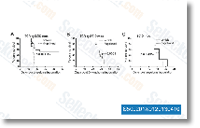Consistent with published studies. the turnover peri ods of perigemmal keratinocytes were a great deal shorter than those of taste recommended site bud cells, with a turnover period estimated to become four. 2 days for that PBS group and 3. 9 days for that LPS group. Related to its impact on taste bud cells, LPS therapy also drastically decreased the number of BrdU labeled cells inside the perigemmal cell population. LPS inhibits proliferation of progenitor cells for taste buds Latest scientific studies suggest that taste bud cells and surround ing keratinocytes are derived from a widespread progenitor cell population residing within the basal regions surrounding the taste buds. This group of progenitor cells expresses cell proliferation markers too as cell lineage regulators, which include Patched1, Sox2, Trp63, and Ki67. reflecting their proliferative properties and roles in cell fate determination.
Considering the fact that selleck LPS remedy inhibits the renewal of both taste bud cells and perigem mal keratinocytes. it really is feasible that the prevalent progenitor cells for both cell lineages are impacted. To investigate regardless of whether LPS suppresses proliferation of progenitor cells for taste buds, we examined the expres sion of Ki67, a cell proliferation marker expressed in all lively phases of the cell cycle. Quantitative true time RT PCR revealed the expression degree of Ki67 mRNA was dramatically decreased while in the circumvallate and foliate epithelia 24 h after LPS treatment method. In con trast, Ki67 expression amounts had been not considerably vary ent in nontaste lingual epithelium from PBS versus LPS taken care of mice. To investigate no matter whether the decreased expression of Ki67 by LPS in taste epithelium was as a consequence of a reduction of proliferating taste progenitor cells, we per formed immunostaining using antibodies against Ki67.
We confirmed that in the circumvallate epithelium, the Ki67 antibody acknowledged a group of cells from the basal areas surrounding taste buds, the niche for taste professional genitor cells. Ki67 immunoreative cells have been  also good for K14 immunostaining. a marker for taste progenitor cells. LPS therapy markedly lowered the number of Ki67 optimistic cells as well as the intensity of Ki67 staining from the basal areas sur rounding circumvallate taste buds. In con trast, Ki67 staining was comparable in nontaste lingual epithelia from PBS and LPS taken care of mice. Collectively, the results from these experiments and BrdU labeling experiments demonstrate that LPS induced inflammation inhibits taste progenitor cell proliferation. LPS suppresses the expression of cyclin B2 and E2F1 in taste epithelium To further investigate the results of LPS induced inflam mation on taste progenitor cell proliferation, we carried out quantitative authentic time RT PCR analysis employing the Mouse Cell Cycle RT2 Profiler PCR Array from SABiosci ences. This PCR array has primers for 84 genes involved with cell cycle regulation likewise as many genes as endogenous controls.
also good for K14 immunostaining. a marker for taste progenitor cells. LPS therapy markedly lowered the number of Ki67 optimistic cells as well as the intensity of Ki67 staining from the basal areas sur rounding circumvallate taste buds. In con trast, Ki67 staining was comparable in nontaste lingual epithelia from PBS and LPS taken care of mice. Collectively, the results from these experiments and BrdU labeling experiments demonstrate that LPS induced inflammation inhibits taste progenitor cell proliferation. LPS suppresses the expression of cyclin B2 and E2F1 in taste epithelium To further investigate the results of LPS induced inflam mation on taste progenitor cell proliferation, we carried out quantitative authentic time RT PCR analysis employing the Mouse Cell Cycle RT2 Profiler PCR Array from SABiosci ences. This PCR array has primers for 84 genes involved with cell cycle regulation likewise as many genes as endogenous controls.
Peptide Solubility
The prohormones are then packaged into membrane-bound secretory vesicles.
